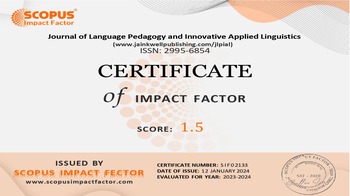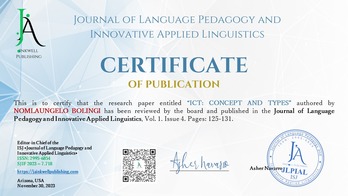Motivation in Language Learning and Teaching
DOI:
https://doi.org/10.1997/mkmq4823Keywords:
motivation, learning and teaching languages, definition of motivation, the nature of motivation, motivation in general educationAbstract
All of these suggestions can or should create motivation in the classroom. If a student has a desire to learn, it means that at some point the student is ready to learn can mean an idea, emotion, or physical need can motivate a student to learn. If the student does not want to learn, learning should occur unlikely. Sometimes physical motivations can motivate a person or a student to learn. Students beliefs and at the same time they affect the probability of change. As you know, motivation is basically a product of students; learning experiences. A students faith can be a powerful motivator and can be influenced by family or teachers. A student believes that whoever studies hard will succeed teaching. However, we have made different key avoiding failure.in this work, we describe the phenomenon of motivation definitions of motivation to get grades and have three dominators.
Downloads
References
Crookes, G, and Schmidt, R (1991). Motivation: reopening the research agenda. Language Learning, 469-512p.
Dornyei, Z. (1990). Conceptualizing motivation in Foreign Language Learning/. Language Learning 458p.
McDonough, S. h. (1981). Psychology in Foreign Language Teaching. London Allen Q. Unwin Ltd.
Begmatov, M. (2021). Infinitive Verbs and Their Grammar Functions in German Language. European journal of innovation in nonformal education, 1(2), 51-53.
Begmatov, M. (2019). About speech word in modern German. In 9th International Conference" Science and practice: a new level of integration in the modern world", Scope Academic House (pp. 32-35).
Begmatov, M. B. (2020). Features of the Organization of an Integrated Introductory Phonetic Course of German as a Second Foreign Language in a Non-Linguistic Higher Educational Institutions. Theoretical & Applied Science, (7), 265-268.
Каримова, Л., & Бегматов, М. (2022). Ҳозирги немис тилида иловали элементларнинг структур ўзига хосликлари. Современные лингвистические исследования: зарубежный опыт, перспективные исследования и инновационные методы преподавания языков, (1), 61-62.
Бегматов, М. (2022). Иловали конструкцияда тема ва рема муносабатларининг ифодаланиши. Современные лингвистические исследования: зарубежный опыт, перспективные исследования и инновационные методы преподавания языков, (1), 8-9.
Саидов, З., & Бегматов, М. (2022). Иловали элементларнинг асосий ифодага боғланиш усуллари ҳақида. Современные лингвистические исследования: зарубежный опыт, перспективные исследования и инновационные методы преподавания языков, (1), 25-26.
Саидов, З., & Бегматов, М. (2022). Илова конструкциянинг ўзига хос хусусиятларини ўрганишга доир. Ta'lim va rivojlanish tahlili onlayn ilmiy jurnali, 61-63.
Mukhtor, B. (2022). Using innovative and pedagogical technologies in German language classrooms. Academicia: An International Multidisciplinary Research Journal, 12(11), 35-39.
Mukhtor, B. (2021). The formation of derivative words from the bases of borrowed lexical units in the German language of the modern period. ACADEMICIA: An International Multidisciplinary Research Journal, 11(10), 1377-1385.
Примов, Б., & Бегматов, М. (2016). Аспектологические исследования в Узбекистане. Иностранная филология: язык, литература, образование, (3 (60)), 93-97.
Бегматов, М. (2016). Особенности явления эллипсис в немецком языке. Иностранная филология: язык, литература, образование, 1(2 (59)), 76-80.
Downloads
Published
Issue
Section
License
Copyright (c) 2023 Guzal Suyunova, Mushtariy Shokirova, Zaynab Shermamatova (Author)

This work is licensed under a Creative Commons Attribution 4.0 International License.












